Herb Butter Turkey (and Gravy)

No holiday table is complete without the star of the meal, meaning it is time to make Herb Butter Turkey (and Gravy). Thanks to the beautiful herb butter this recipe creates a perfectly moist turkey that is bursting with flavor.
I love when my family comes over for holiday dinner and the first thing they say when they come into the house is how amazing it smells. The turkey being baked fills the house with warm, comforting aromas, and the gravy cooking on the stove top adds to the deliciousness that wafts out of the kitchen.
This turkey recipe pairs well with our Old Fashioned Turkey Dressing, Idahoan Mashed Potatoes, and Maple Brussel Sprouts. And no turkey dinner would be complete without a big slice of pie; try our Apple Pie a la Mode, Costco Pecan Pie (Copycat) or Pumpkin Pie using Sweetened Condensed Milk.
- Easy: Roasting a turkey is easier than you think, and with our step-by-step guide, you'll feel confident making it year after year.
- Classic: This is such a beautiful recipe that celebrates the turkey with an amazing fresh sage and butter coating.
- Gravy: Who doesn't love a mouth-watering gravy? This recipe offers the perfect pairing for your turkey, mashed potatoes, stuffing, and anything else you'd like to serve it with!
The turkey is the main ingredient for this recipe. Add fresh sage, butter, salt and apple cider to create absolute deliciously roasted turkey. The gravy comes together easily with chicken broth, more apple cider, and cornstarch.
See the recipe card below for the exact quantities of each ingredient.
- Fresh Turkey: If you can find a fresh turkey it's a great time-saver, but in this recipe, we used a frozen turkey that had been thawed. See our notes below for more about thawing time.
- Unsalted Butter: This allows you to control salt content but salted butter will also work.
- Fresh Sage: This brings an earthy freshness to the dish.
- Kosher Salt: Seasoning is key to a juicy turkey as salt helps to tenderize the meat.
- Apple Cider: This brings an unexpected autumn flavor to the overall dish. If you leave the alcohol out of our Spiked Apple Cider Crockpot recipe, you can use that instead of store-bought.
- Chicken Broth: This is the easiest way to create a flavorful base for your gravy. If you make your own homemade chicken stock, feel free to use it!
- Cornstarch: This helps to thicken the gravy.
For this recipe, you'll want to have on hand a roasting pan with a rack insert, medium saucepan, meat thermometer, measuring cups, and measuring spoons.
Love this recipe but want to make it your own? Here are some helpful ideas for you to change this Turkey and Gravy recipe.
- Herbs: You can substitute sage for any other fresh herbs of your choice, such as rosemary or thyme, or even a blend of all three.
- Chicken Stock: If you don't have apple cider, you can sub it for chicken stock.
- Citrus: Add a bright, fresh flavor to your turkey by adding lemon zest to your herb butter.
- Olive Oil: Instead of butter, you can use olive oil on turkey for roasting. Baste your turkey with olive oil for a crispy skin.
While cooking a turkey for the first time can be daunting, don’t fret. Be sure to allow yourself ample time to prepare and cook the turkey as well as time to let it rest before serving. Trust me, your guests will certainly want seconds and maybe thirds once they’ve tasted your turkey!
Set rack at lowest position in oven and preheat to 375F. Place the turkey on a rack in the roasting pan (you can lightly grease the rack if you want), pat turkey dry and set aside (note: for a juicier turkey you can cook it breast side down).
Melt butter in a small saucepan then add in chopped sage. Brush over the turkey and sprinkle with salt. Roast turkey 1 hour; baste with any pan juices once or twice, then reduce the temperature to 350F. Roast for another 30 minutes, basting every 15 minutes.
Pour apple cider overtop and rotate the pan. Keep cooking until instant thermometer reads 165F (we recommend checking the thickest part of each thigh), while continuing to baste every 15 minutes or so. Transfer turkey to platter and loosely cover with tinfoil.
Strain all pan juices into a large 4 cup measuring cup (do not scrape the pan), and transfer about 3 tablespoons of fat into a medium saucepan (discard the rest of the fat, or as much as you can) and set aside.
Place the roasting pan over 2 burners on the stove and add chicken broth and apple cider and bring to a boil over medium-high heat. Scrape up any brown bits and cook for about 10 minutes (lower to medium heat if needed) and reduce until you have about 2 ½ cups of liquid and strain into the measuring cup with the pan juices (note: if you have less than 3 ½ cups in total, add more chicken stock). Set aside.
Place the medium saucepan (with the fat) over medium high heat and add 1 tablespoon of cornstarch, mix until combined. Then pour in the 3 ½ cups of juices and whisk until desired thickness.
Hint: Thawed turkey needs to be brought to room temperature before cooking. This will ensure a more even cook through the bird when roasted.
Any turkey dinner is bound to have leftovers, but don’t worry, because you can easily store them in the fridge or freezer.
- Refrigerator: Once cooled, place turkey in an airtight container for 3-4 days.
- Freezer: Place in a freezer-safe container and store for up to 3 months.
- Reheating: Once brought to room temperature it can be reheated in the microwave.
- Make Ahead: You could make this turkey ahead of the day you are serving it. Typically, the best practice for safety is to put away turkey within two hours if it has just been cooked and is cooling. When getting ready to serve, cover with tin foil and place in the oven on low to reheat without drying the bird out.
Turkey takes centre stage in your holiday spread and deserves all the tastiest side dishes. Here are our favorite pairings for this roasted turkey recipe.
- Idahoan Mashed Potatoes: We love potato side dishes in every form, but this mashed potato recipe is a tried and true classic.
- Old Fashioned Turkey Dressing: No turkey is complete without a side of dressing.
- Maple Brussel Sprouts: Sweet and salty roasted Brussels sprouts are a delicious way to include some vegetables in your holiday meal.
- Whole Berry Cranberry Sauce: Cranberry sauce adds a welcome hint of sweetness to an otherwise savory meal.
- Cornbread without Buttermilk: The perfect side addition to any holiday spread.
- Pumpkin Pie with Sweetened Condensed Milk: Every dinner should be served with dessert, especially a turkey dinner. I cannot think of a better way to end a lovely meal than having a slice of pumpkin pie.
Once you have allowed your turkey to come to room temperature before cooking, it is very important to dry the turkey skin before adding the butter and sage topping. Water on the bird will ruin a crispy skin. Dab the bird with paper towel for best results.
Do you have questions about Herb Butter Turkey and Gravy? Here are some of the most commonly asked questions.
You can use fresh, but if you use a frozen turkey, be sure to thaw out fully in the refrigerator first. Guidelines are to allow 1 day in the fridge for every 5 pounds.
Why do I need to start cooking at a higher temperature before reducing the heat?Cooking at a higher temperature at the beginning helps to seal in the juices and crisps the skin to a beautiful golden brown color.
How do I carve the turkey?Start by removing the legs and wings, then slice along the breastbone to remove the breasts. Slice the breast meat against the grain for tender pieces.
Check out some more of our recipes you will want to try!
Honey and Brown Sugar Glazed Carrots
Ready to get cooking? Save time by having a grocery list automatically generated for you by clicking the "Add to Shopping List" below.
We would be so grateful for you to leave us a rating and review on any recipes you try. If you make any alterations, let us know how they turned out.
Herb Butter Turkey (and Gravy)
Recipe details
Ingredients
Turkey:
- 16 pound turkey rinsed, patted dry
- 1/2 stick unsalted butter 1/4 cup
- 1/4 cup fresh sage chopped
- 1 tablespoon coarse kosher salt
- 1 cup apple cider fresh, refrigerated
Gravy:
- 2 cups chicken broth low sodium
- 3/4 cup apple cider sweetened
- 1 tablespoon cornstarch
Instructions
Turkey:
- Set rack at lowest position in oven and preheat to 375F. Place the turkey on a rack in the roasting pan (you can lightly grease the rack if you want), pat turkey dry and set aside (note: for a juicier turkey you can cook it breast side down).
- Melt butter in a small saucepan then add in chopped sage. Brush over the turkey and sprinkle with salt.
- Roast turkey 1 hour; baste with any pan juices once or twice, then reduce the temperature to 350F. Roast for another 30 minutes, basting every 15 minutes.
- Pour apple cider overtop and rotate the pan. Keep cooking until instant thermometer reads 165F (we recommend checking the thickest part of each thigh), continue to baste every 15-30 minutes.
- Transfer turkey to platter and loosely cover with tinfoil.
Gravy:
- Strain all pan juices into a large 4 cup measuring cup (do not scrape the pan), and transfer about 3 tablespoons of fat into a medium saucepan (discard the rest of the fat, or as much as you can). Set aside.
- Place the pan over 2 burners on the stove and add chicken broth and apple cider and bring to a boil over medium-high heat. Scrape up any brown bits and cook for about 10 minutes (lower to medium heat if needed) and reduce until you have about 2 ½ cups of liquid and strain into the measuring cup with the pan juices (note: if you have less than 3 ½ cups in total, add more chicken stock). Set aside.
- Place the medium saucepan (with the fat) over medium high heat and add 1 tablespoon of cornstarch, mix until combined. Then pour in the 3 ½ cups of juices and whisk until desired thickness.
Tips
- For a juicier turkey, you can cook it breast side down.
- After removing the turkey from the oven, let it rest for 20-30 minutes before carving. This allows the juices to redistribute, keeping the meat moist. This is the perfect time to make your gravy with pan drippings.
- Adjust your gravy to your desired consistency. If it is too thin, let it simmer to reduce longer, or add a cornstarch slurry. If it is too thick, it can be thinned by adding extra chicken broth.

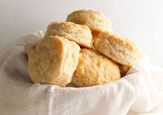


















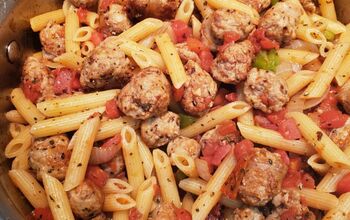
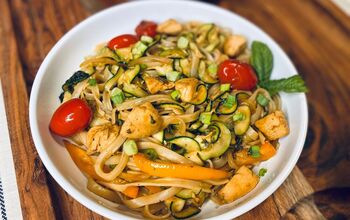
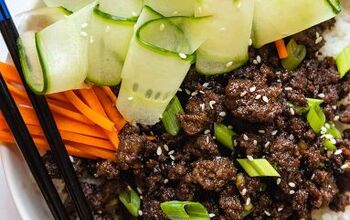
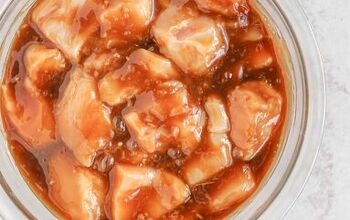
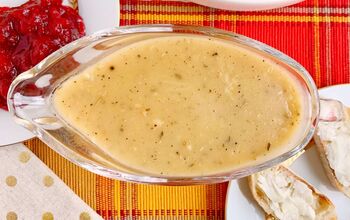






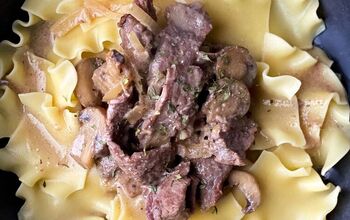
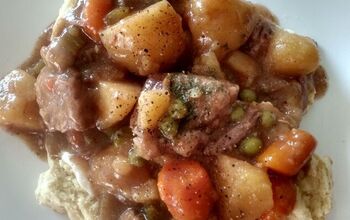
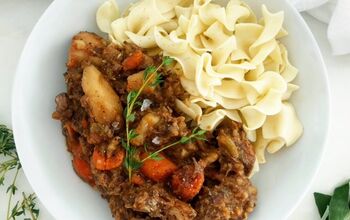
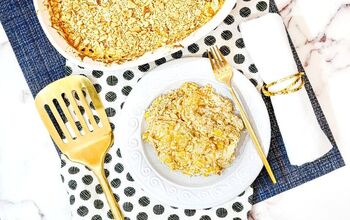
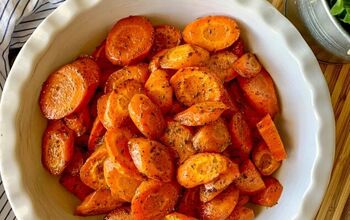
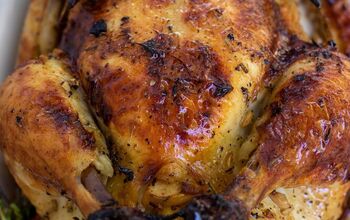
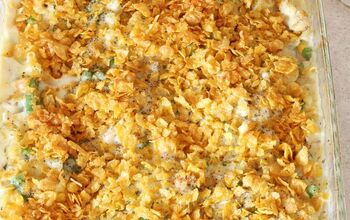

Comments
Share your thoughts, or ask a question!